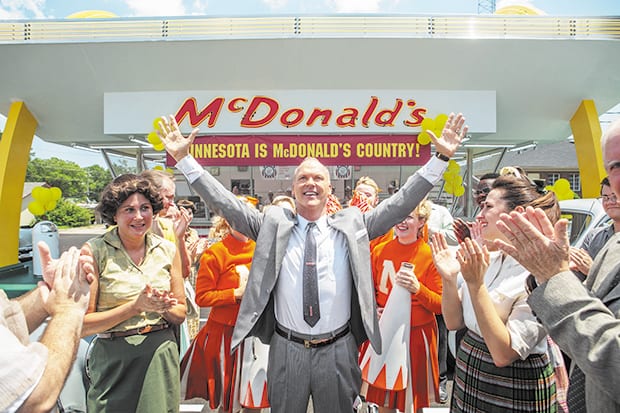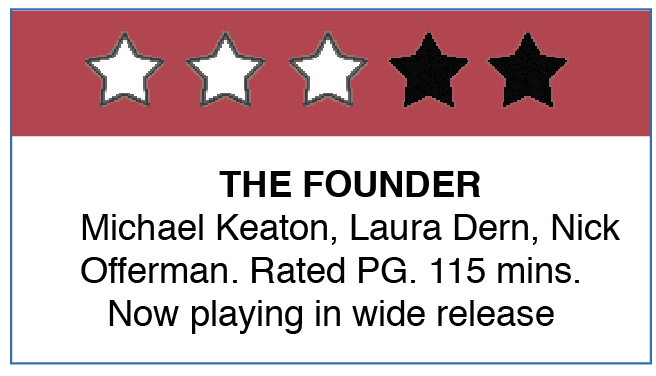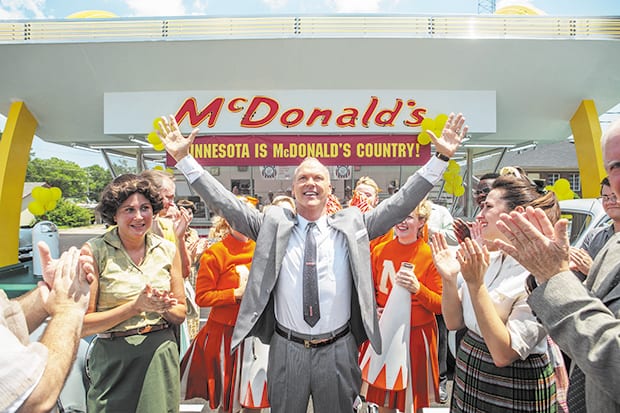Michael Keaton plays the man who invented an industry in ‘The Founder’

YOU WANT FRIES WITH THAT? | Business ethics clash with real ethics in the poignantly timely biopic ‘The Founder.’
ARNOLD WAYNE JONES | Executive Editor
 Who cured polio? Jonas Salk, right? No — Albert Sabin’s oral vaccine was easier to give, had longer-lasting effects and was more widely used almost from Day One. And Eli Whitney invented the cotton gin, yes? Well, scholarship suggests his landlady, Catharine Greene, made the most significant contributions to the idea, but women couldn’t hold patents in the 18th century so Eli got full credit. And don’t ask Robert Gallo who discovered the pathogen we now call HIV.
Who cured polio? Jonas Salk, right? No — Albert Sabin’s oral vaccine was easier to give, had longer-lasting effects and was more widely used almost from Day One. And Eli Whitney invented the cotton gin, yes? Well, scholarship suggests his landlady, Catharine Greene, made the most significant contributions to the idea, but women couldn’t hold patents in the 18th century so Eli got full credit. And don’t ask Robert Gallo who discovered the pathogen we now call HIV.Who gets credit for a thing often pivots on what the “thing” is we’re giving credit for.
So who created McDonald’s: The McDonald brothers of San Bernadino, Calif., who started the first pop-and-pop burger stand with their name on it; or Ray Kroc, a spit-and-shoe-leather salesman from the Midwest who saw their concept’s potential and turned it into a business juggernaut, second only to Coca-Cola worldwide as the single most identifiable brand since the Holy Roman Empire? That’s what The Founder tries to convince you of.
You might think the film’s title — singular Kroc (Michael Keaton), not plural McDonalds (Nick Offerman and John Carroll Lynch) — makes its position clear, but oh, you would be missing the irony and misdirection that storytellers love. And the Mickey D’s story is a great and compelling one: Their own drive and ingenuity; their innovations in design, menu and work-flow; their quality control standards. Even their decision to get rid of the then-popular drive-in model and throw away cigarette machines to cut down on the riff-raff (i.e., teenagers) and help them market their first store as family-friendly. But they were slow to change, hesitant to grow.
Kroc did not share their timidity. Already 52 when he met the brothers, he saw the potential for a coast-to-coast chain — the McDonalds may have invented “fast food,” but Kroc was intent on inventing “the fast food industry.”
There seems little doubt that without Kroc, we wouldn’t be talking about McDonald’s today. The question is: Would that be a good thing? The conundrum of The Founder is its split personality: It spends the first 80 percent convincing us to root for Ray (played with leprechaunish mischief by an energetic Keaton) and the last 20 percent showing us what a cutthroat bastard he could be. He introduced powdered “milk” shakes; turned his franchise-restaurant business into a real estate business that ruled with an iron fist; and if you know his widow was named Joan, then knowing that Laura Dern’s character is named Ethel gives you a hint at his personal life. But rather than a warts-and-all biopic, The Founder is more a case study in business ethics … and one that concludes “good business” and “good citizenship” rarely intersect.
It’s an interesting message to digest this week in particular, as a self-proclaimed real estate mogul with a history of cheating his vendors rises to the highest office in the land: Selfless stewardship and corporate greed clashing in the Oval Office. It makes The Founder resonate in a way I don’t think it fully intended — as a cautionary tale of how the American Dream can cost a nation its soul.
This article appeared in the Dallas Voice print edition January 20, 2017.

